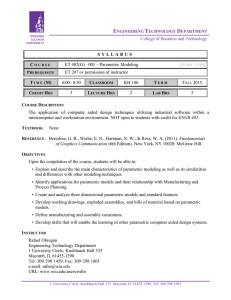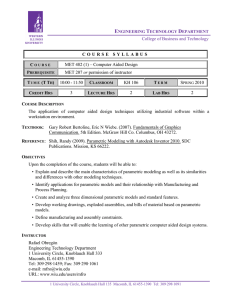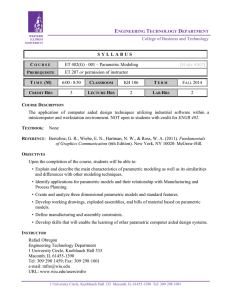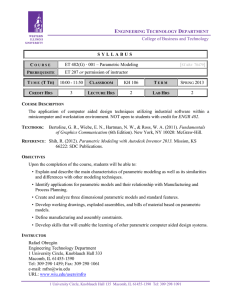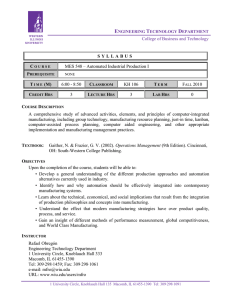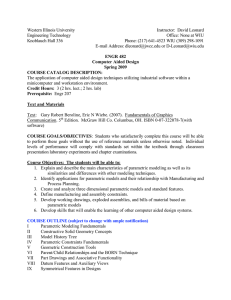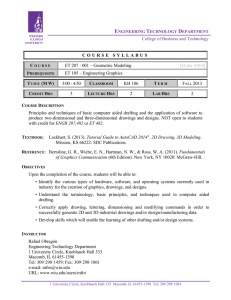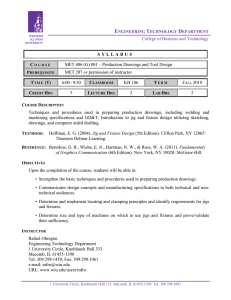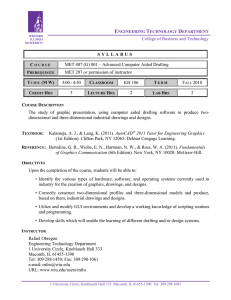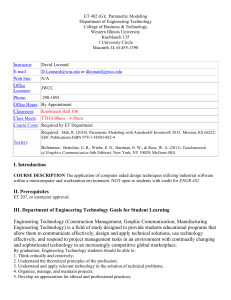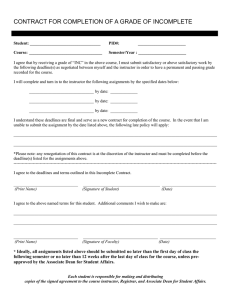E T D
advertisement
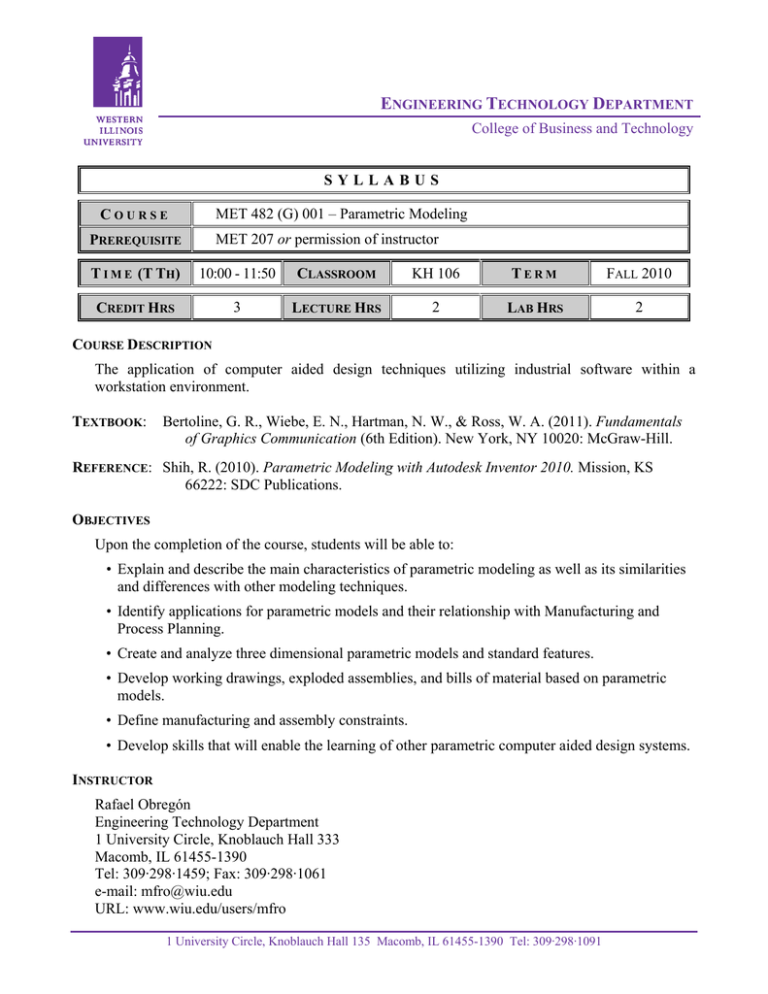
ENGINEERING TECHNOLOGY DEPARTMENT College of Business and Technology SYLLABUS MET 482 (G) 001 – Parametric Modeling COURSE MET 207 or permission of instructor PREREQUISITE T I M E (T TH) 10:00 - 11:50 CLASSROOM KH 106 TERM FALL 2010 CREDIT HRS 3 LECTURE HRS 2 LAB HRS 2 COURSE DESCRIPTION The application of computer aided design techniques utilizing industrial software within a workstation environment. TEXTBOOK: Bertoline, G. R., Wiebe, E. N., Hartman, N. W., & Ross, W. A. (2011). Fundamentals of Graphics Communication (6th Edition). New York, NY 10020: McGraw-Hill. REFERENCE: Shih, R. (2010). Parametric Modeling with Autodesk Inventor 2010. Mission, KS 66222: SDC Publications. OBJECTIVES Upon the completion of the course, students will be able to: • Explain and describe the main characteristics of parametric modeling as well as its similarities and differences with other modeling techniques. • Identify applications for parametric models and their relationship with Manufacturing and Process Planning. • Create and analyze three dimensional parametric models and standard features. • Develop working drawings, exploded assemblies, and bills of material based on parametric models. • Define manufacturing and assembly constraints. • Develop skills that will enable the learning of other parametric computer aided design systems. INSTRUCTOR Rafael Obregón Engineering Technology Department 1 University Circle, Knoblauch Hall 333 Macomb, IL 61455-1390 Tel: 309·298·1459; Fax: 309·298·1061 e-mail: mfro@wiu.edu URL: www.wiu.edu/users/mfro 1 University Circle, Knoblauch Hall 135 Macomb, IL 61455-1390 Tel: 309·298·1091 MET 482 – PARAMETRIC MODELING FALL 2010 EVALUATION Participation (15%): Each student is expected to complete several outside reading assignments, from the textbook or other resource materials, in order to be prepared for every class. Class discussions, quizzes, exams, presentations, or written reports, could be used to evaluate the fulfillment of this task. Assignments/Projects (45%): Approximately 10 projects will be assigned during the semester. Each one is worth 100 points (points will be deducted according to the evaluation criteria explained in class). Due dates will be set for each given assignment. Any assignment that is turned in late will NOT be graded, and thus not recorded. Students who are absent can usually make up missed work, NOT including quizzes, exams, or presentations. It is the STUDENT'S responsibility to review missed lectures and lab material, and to make arrangements for make-up work upon their return to class. Mid Term Exam (20%): A Mid Term Exam, related to the course objectives, will be given during the semester. Other tests may also be administered. All tests will be announced in advance; no make-up tests are given. A grade of "0" will be recorded for a missed test. Midterm Exam: Thursday, October 14 (10:00 am) Final Project (20%): All students will be given a final project, which is due the last session of the semester. Students will presents the results of the project during the time assigned for final exam. If the project is not turned in, the student will not be allowed to make the final project presentation. Extra Credit Work: Several extra credit assignments will be given during the semester. Students are NOT required to fulfill these activities, but each such assignment completed correctly (on time) can help raise a final grade. A grade of “85” or higher is required for the assignment to be recorded. GRADING INFORMATION The following scale will be used to determine individual assignments/projects, tests, and final grade: 100 93 90 87 83 80 - 94 % 91 % 88 % 84 % 81 % 78 % = = = = = = A AB+ B BC+ 77 73 70 67 63 60.99 % - 74 % 71 % 68 % 64 % 61 % below = = = = = = C CD+ D DF SAVE all assignments after they are graded and returned. Mistakes can inadvertently be made during grade recording. It is easier to resolve question concerning grades if all returned work is saved until after the course is completed. RAFAEL OBREGÓN 2 MET 482 – PARAMETRIC MODELING FALL 2010 COURSE POLICIES Conduct: It is expected that students behave properly in class. Students who disrupt class (including the use of cellular telephones or pagers), or deface equipment or property will be removed from the classroom, and penalized in the current assignment/project, and in extreme cases with a FAILING final grade. Plagiarism, cheating, and other forms of academic dishonesty constitute a serious violation of University conduct regulations. Students who engage in dishonesty in any form shall be charged with academic dishonesty. Cheating will result in FAILING the course automatically. Attendance: Do NOT miss classes, attendance and participation are required. Lectures and demonstrations will occur at varying times during the class period. However, attendance for the whole session is not always necessary if the required assignment/project has been completed and turned in. Absences will be recorded and will affect the final grade (4 absences = -1 letter grade) STUDENT RIGHTS AND RESPONSIBILITIES It is essential that all students know what is required of them in order to complete a course satisfactorily. To that end, the Office of the Provost and Academic Vice President recommends that students become familiar with the guideline concerning their rights and responsibilities. The guidelines are available on-line at: www.wiu.edu/provost/students. STUDENTS WITH DISABILITIES In accordance with University policy and the Americans with Disabilities Act (ADA), students who may require special accommodations due to a disability, or any other medical reason, are encouraged to discuss this matter with the instructor. The instructor is not legally permitted to inquire about such particular needs. Also, students requiring special assistance in emergency evacuations (i.e. fire, tornado, etc.) should contact the instructor as to the most appropriate procedures to follow in such an emergency. Contact Disability Support Services at 298-2512 for additional services. SPECIAL COURSE COSTS: Each student is required to reimbursing the department for the cost of the materials furnished for the class and for lab maintenance. The amount that has been established is $ 25.00, and needs to be paid in full no later than October 15, 2010 in the Engineering Technology Department office. If the Special Course Costs is not PAID by October 29, 2010; the costs will be doubled and turned over to the University Business Services office. LAST DAY TO DROP COURSE If any student decide that it is in her/his best interest to drop the course, the last day to do so for this semester is September 3, 2010. RAFAEL OBREGÓN 3 MET 482 – PARAMETRIC MODELING FALL 2010 INCOMPLETE GRADE POLICY A temporary I (Incomplete) grade for a course may be issued to a student only when, due to circumstances beyond her/his control, the individual has been unable to complete the course requirements within the official limits of the term. The circumstances must be documented to the instructor's satisfaction. GRADUATE STUDENTS Students taking the class for graduate (G) credit will be expected to perform at a higher level and to complete additional assignments. It will be the student's own responsibility to make arrangements with the instructor early in the school term for those supplemental assignments. Individual assignments/projects, tests, and final grade will be determine using the following scale: 100 - 91 % = A; 90 - 81 % = B; 80 - 70 % = C; 69 – below = F RESOLUTION OF PROBLEMS Circumstances, of any kind, interfering with a student performance in the course should be brought to their instructor first. If problems are not resolved, the student must seek assistance from the chair of the department. If the problem continues to be unresolved, students are encouraged to bring the issue to the Dean of the College. Students should observe the following sequence for the resolution of problems: Student → Instructor → Chairperson → Dean GOALS FOR STUDENT LEARNING The Department of Engineering Technology is committed to provide educational programs that allow students to communicate effectively, design and apply technical solutions, use technology effectively, and respond to project management tasks in an environment with continually changing and sophisticated technology in an increasingly competitive global marketplace. By graduation, Engineering Technology students (in Construction Management, Graphic Communication, and Manufacturing Engineering Technology) should be able to: • Think critically and creatively • Understand the theoretical principles of their profession • Understand and apply relevant technology in the solution of technical problems • Organize, manage, and maintain projects • Develop an appreciation for ethical and professional practices • Develop and refine oral, written, and visual communication skills • Demonstrate an overall competency in the program objectives COURSE OUTLINE AND OFFICE HOURS: www.wiu.edu/users/mfro/classes.htm Syllabus subject to change upon notice. RAFAEL OBREGÓN 4
